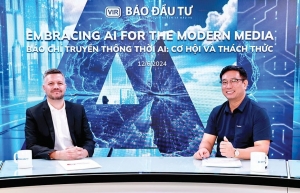How startups can navigate AI revolution
Collectively, communities, businesses, and governments must come together to work through this balance and enable innovation. This is especially as 97 per cent of ASEAN employers envision their companies becoming AI-driven organisations by 2028, in a recent Asia-Pacific-wide study conducted by Amazon.
 |
| Eric Yeo, country general manager Amazon Web Services, Vietnam |
While almost all employers (96 per cent) believe their IT department will be the biggest beneficiary from AI, they also foresee research and development (94 per cent), finance (93 per cent), sales and marketing (92 per cent), legal (86 per cent), and human resources (88 per cent) departments benefitting from AI as well.
However, AI can seem overwhelming for small and medium-sized enterprises, which often do not have the time or resources for experimentation. This can obstruct innovation and curtail opportunities by slowing adoption rates.
That’s why Amazon believes that responsible use of AI technologies is the key to fostering innovation. We’re committed to developing fair and accurate AI services, and we believe governments also play a critical role in driving responsible AI to give ASEAN businesses the best possible foundation on which to grow.
In today’s increasingly interconnected world, a key factor for responsible AI is to engage local communities in the process of developing AI. Across ASEAN, many of the tools used to build and manage AI, like the large language models that are the building blocks of generative AI, need to be developed with diverse input from regional representatives.
Including such local, diverse perspectives in AI development is incredibly important in allowing more people to shape this emerging technology – by making it more relevant to them and ensuring that they have the opportunity to influence AI-driven trends that will grow to eventually affect their lives and livelihoods.
Key to this is investing in, and democratising access to skills training for AI. As it stands, there is a clear and growing demand for AI skills training across the region. In ASEAN, the study previously mentioned found that more than 9 in 10 workers indicated an interest in developing AI skills to accelerate their careers, and this interest transcends generations.
When broken down, over 90 per cent of workers in the Gen Z, Millennial, and Gen X age groups positively indicated they wanted to acquire AI skills, while 86 per cent of baby boomers – a demographic usually contemplating retirement – say they would enrol in an AI upskilling course if offered.
Our study also found that the productivity payoff from an AI-skilled workforce could be immense for countries across ASEAN. Surveyed employers expect productivity to increase by 54 per cent as AI technology automates repetitive tasks, improves workflow and outcomes, and enhances communication.
Alongside productivity, engagement with AI upskilling allows more people to participate in AI-related conversations and lend their diverse perspectives to global policymaking processes that will affect the systems, norms, and mechanisms of their daily lives.
Employers play a critical role in promoting employee adoption of skills and competencies, preparing staff for an AI-driven workplace while being aware of developments in the AI space. This is doubly useful for small businesses, which can benefit immensely from the gains in productivity that AI can bring, while being involved in AI’s evolution from an early stage.
Holistic and structured learning paths can be configured for employees to transition them from foundational AI skills to more advanced concepts and capabilities. Applying taught concepts to real-world contexts can quickly establish the utility of AI in diverse situations and prepare employees to deploy AI effectively. For example, Amazon Web Services offers free courses as part of our AI Ready initiative to help train over two million workers globally.
Employers can further leverage our comprehensive range of cloud training resources, with over 70 free training courses in Vietnamese. Already, over 50,000 workers have been trained by us on cloud skills since 2017.
These courses can help employers assess and identify skill gaps to tailor training programmes for specific business needs, aid in showing how AI is here to assist, explore how it can be used to complement existing competencies, improve productivity, create new career opportunities, and leverage tailored training programmes on practical applications of AI technologies.
As organisations, governments, and communities come together to create frameworks and standards for responsible AI, we can realise AI’s potential to transform and create better societies for all.
 | Fresh opportunities from AI in Vietnamese aviation In the earlier industrial revolutions, technology and equipment increasingly replaced human manual labour. In Industry 4.0, especially with breakthrough technologies such as the cloud, big data, the Internet of Things, and AI, there is an expectation that machines and tech will replace human labour. |
 | AI transforming Vietnam’s businesses for the better While AI is a key in the process of innovation and accelerating economic development, it needs support from many sides to strengthen the workforce and related startups. |
 | Accuracy more vital than ever in dawn of AI In the past year, Vietnam Investment Review has propelled itself forward by continuing its mission to deliver timely and informative content across a range of medium. In that time, in this author’s eyes, there have been some improvements in terms of scope, usefulness of content, and widening the platform for more experts and organisations to provide much-needed analysis. |
What the stars mean:
★ Poor ★ ★ Promising ★★★ Good ★★★★ Very good ★★★★★ Exceptional
Related Contents
Latest News
More News
- PM outlines new tasks for healthcare sector (February 25, 2026 | 16:00)
- Ho Chi Minh City launches plan for innovation and digital transformation (February 25, 2026 | 09:00)
- Vietnam sets ambitious dairy growth targets (February 24, 2026 | 18:00)
- Masan Consumer names new deputy CEO to drive foods and beverages growth (February 23, 2026 | 20:52)
- Myriad risks ahead, but ones Vietnam can confront (February 20, 2026 | 15:02)
- Vietnam making the leap into AI and semiconductors (February 20, 2026 | 09:37)
- Funding must be activated for semiconductor success (February 20, 2026 | 09:20)
- Resilience as new benchmark for smarter infrastructure (February 19, 2026 | 20:35)
- A golden time to shine within ASEAN (February 19, 2026 | 20:22)
- Vietnam’s pivotal year for advancing sustainability (February 19, 2026 | 08:44)

 Tag:
Tag:



















 Mobile Version
Mobile Version